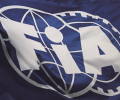Technologies and strategies for the future set out at first World Motor Sport Council meeting of 2024
- WRC Working Group presents key objectives for the next generation of regulations - informed by FIA fan survey and approved for next phase by the WMSC
- FIA sets out new vision for future of hydrogen fuel technology
- Drivers’ Committee presents Driving Standards Guidelines for circuit championships
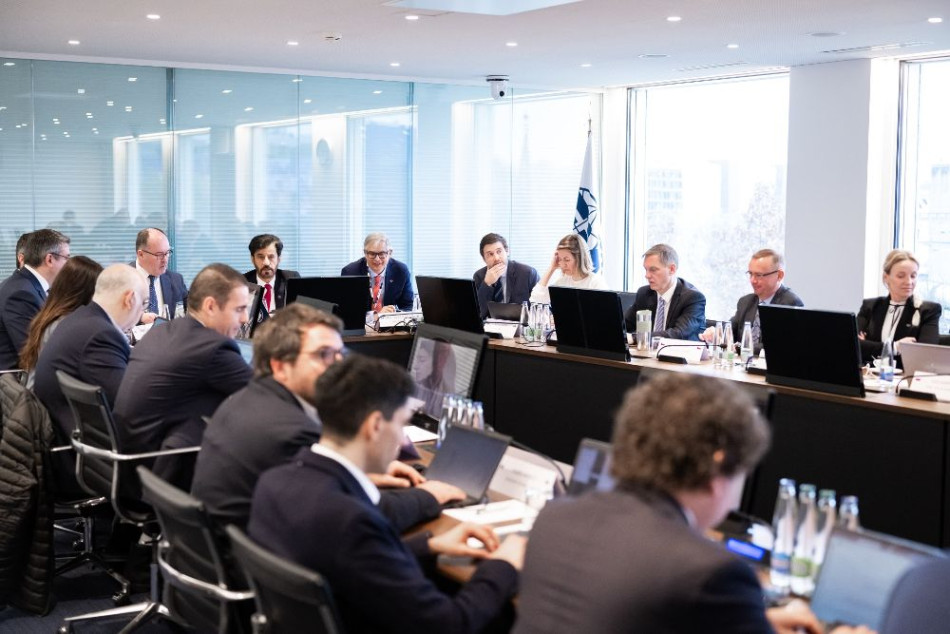
The FIA World Motor Sport Council convened today, 28 February, for its first meeting of 2024. The meeting was chaired by President Mohammed Ben Sulayem with FIA Deputy President for Sport Robert Reid and WMSC members joining in person at the Federation’s offices in Geneva and from around the world via video conference.
In his opening address, the FIA President updated the World Council on new Commission President appointments. He said:
“This gathering is a momentous occasion as we welcome our new Presidents and Chairpersons to a number of Commissions and Committees. I am delighted to say that four of the newcomers are women. The FIA is dedicated to growing the number of women in senior posts within the FIA, and these appointments are an important step in our efforts to achieve this.”
Noting some significant events that have taken place since the previous World Council gathering which took place as part of the General Assembly in Baku, Azerbaijan in December 2023, he added:
“In recent months we have held the MENA and Africa Karting Cup events, a first for the African region. Motor sport that is affordable and accessible for all – that is our goal – and we are indebted to the support of our Member Clubs for the staging of these events.”
Pathway for the future of the FIA World Rally Championship agreed
The roadmap for the future of the FIA World Rally Championship, presented to the World Council over the past two days by the WRC Working Group, has been given the green light. The Working Group has generated a review of the current state of the championship, a record of the sport’s key attributes to be sustained, and the definition of a series of objectives for the future.
Established at the request of FIA President Mohammed Ben Sulayem in December and headed by FIA Deputy President for Sport Robert Reid and WMSC member David Richards, the Working Group, comprising WMSC representatives Garry Connelly, Ronan Morgan and Andrew Mallalieu as well as FIA executives Andrew Wheatley and Xavier Mestelan Pinon, have put forward objectives that prioritise plans for far greater focus on PR, Marketing and Promotion of the Championship, and set a framework for changes to the sporting and technical aspects of the WRC to be developed.
The WRC Commission has now been tasked with drafting concrete proposals, based on the WRC Working Group’s recommendations, for submission to the next WMSC meeting, with the new sporting and technical regulations for the 2025 WRC season and beyond to be published by the end of June.
As well as utilising their extensive expertise and experience, the WRC Commission representatives will also be taking into consideration the results of the WRC Fan Engagement Survey. The survey, which was commissioned by the FIA and received more than 11,000 responses, provided invaluable feedback on several topics, such as the format of rallies, car type and specification.
The key objectives have been set out as follows:
Promotion
- In order to leverage promotional opportunities around each event and maximise the WRC’s full potential, the FIA will establish a WRC Promotion Team within the FIA in close collaboration with stakeholders from the WRC Promoter, event organisers and manufacturer teams.
- The WRC Promotion Team’s key focus will be to develop a WRC Charter that will define a set of commitments from all stakeholders to promote the WRC to a wider audience against an agreed set of objectives and KPIs.
- This coordinated approach will leverage the expertise of each party in order to promote the WRC outside its current fan base as one of the foremost motor sport championships in the world.
Sporting
- Event organisers will be given more freedom when developing the route of their rally. However, while the starting day of an event and the number of stage kilometres can vary, all rallies should finish on a Sunday with the Power Stage.
- The global calendar may include a small number of shorter sprint-style and longer endurance events in addition to the rallies that follow the existing format. Nevertheless, the overall timed kilometres covered during a season will remain largely unchanged with events still organised on a mix of asphalt, gravel and snow.
- As part of cost-cutting measures, the target number of personnel of a three-car team will be capped in the future.
- The service park set-up will follow a new model with manufacturers allocated locally sourced structures as a working space. As well as saving costs and reducing the amount of transportation required, the move provides more flexibility, should the service park location change during an event. It also reduces the total area required for the service park by event organisers.
- To allow organisers to adopt less rigid formats, reduce liaison section distances and spread the reach of events, remote service opportunities will be encouraged with teams permitted to carry limited parts in a small support vehicle.
Technical
- The current Rally1 car will continue as the WRC’s flagship vehicle in both 2025 and 2026 but with modifications to reduce cost and performance. These include the removal of the plug-in hybrid unit, with the performance compensated by a reduction in overall weight, and a reduction in the air restrictor and aerodynamics.
- Rally2 cars will continue in their current form for the duration of their homologation as the basis for national and international series. However, Rally2 cars competing on WRC events from 2025 and beyond will have an option to run with a WRC kit consisting of a larger restrictor, a larger exhaust, an optional paddle shift gearbox and a rear wing with the objective of reducing the performance gap between Rally1 and Rally2 cars.
- From 2026, revised Rally1 technical regulations for the WRC’s top-level category will be introduced based on the current Rally1 concept. These regulations will run alongside the current Rally1 regulations for the 2026 season. These new rules will use a common safety cell to reduce costs and complexity, and allow manufacturers and tuners to develop cars with their own bodywork based on production models including B-class, C-Class, compact SUV or a Concept Car designed to tight technical criteria such as centre of gravity and aerodynamics in order to equalize performance.
- The power output will be targeted at 330hp, with the engine performance controlled by a reference torque curve for all cars. Engine and transmission will be cost-capped and technology limited to Rally2 equivalence. Aerodynamic efficiency will be limited along with a top speed restriction to reduce development and cost.
- The cost per car will be capped at €400,000 and WRC manufacturers will be required to make their cars available for sale directly from the finish parc fermé of a WRC event.
- At the earliest opportunity, an electric category will be introduced into the WRC with the FIA technical department charged with establishing suitable technical regulations that could utilise the new Rally1 safety cell and achieve parity of performance with Rally1 cars running on sustainable fuel.
FIA President Mohammed Ben Sulayem said: “The WMSC members carefully considered the recommendations of the WRC Working Group and were united in their support of the series of objectives that have been established. To be at the point where the WRC Commission can now work on finalising proposals that will go a long way towards cementing the WRC’s future course, once approved by the WMSC, is a significant moment for the championship, its stakeholders and the rallying community in general. It’s also important to note that the results of the WRC Fan Engagement Survey will be carefully considered by the WRC Commission during the process of drafting the final proposals. I thank all those who took part as we continue the process of delivering a WRC that’s relevant for the present and fit for the future.”
A new alternative – FIA presents vision for future Hydrogen fuel technologies
As part of the FIA’s energy transition road map, which defines gradual introduction of sustainable power sources in motor sport, the FIA continues development of hydrogen-fuelled power units across different disciplines and competitions.
As the next phase, the FIA will focus its efforts on contribution to development and promotion of solutions based on hydrogen stored in liquid form (LH2). Given the tank’s characteristics, lower volume and weight compared to compressed gas tanks (CGH2), liquid storage form is better suited to the demanding environment of motor sport competitions, where optimisation is key. This also allows the powertrain layout to remain closer to the one of a conventional combustion-powered car compared with vehicles accommodating compressed gas tanks.
Solutions utilising compressed gas storage type will be considered as interim solution, provided minimum safety and technical requirements are met.
The FIA has been leading the work on regulations for hydrogen-powered vehicles in motor sport, with safety being one of the key considerations, since 2019, when it formed its FIA Hydrogen Technical Working Group, gathering numerous manufacturers and industry-leading companies.
In 2020, the FIA World Motor Sport Council approved the addition of article 253.19 (which outlines safety regulations for hydrogen-powered vehicles in motor sport) to its International Sporting Code.
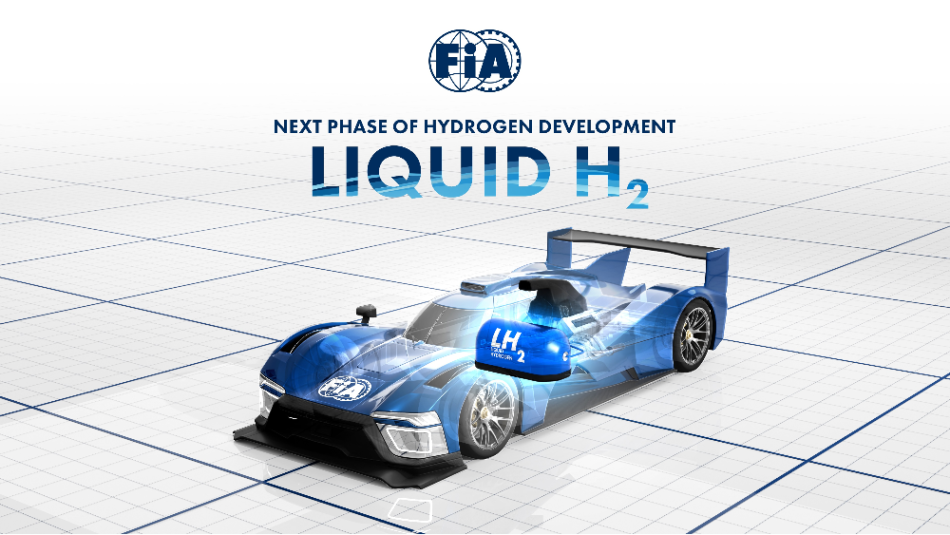
Global consistency for circuit racing championships
Following analysis and consultation between drivers, officials, and stewards over the past year, a set of Driving Standards Guidelines has been produced by the FIA Drivers’ Committee in partnership with the FIA’s Circuit Commission and Safety Department.
Presented to the World Council today, the guidelines will apply to all categories of circuit racing from grassroots to World Championship competitions, providing for the first time a globally consistent reference point to support not only drivers as they develop throughout their careers, but also the Race Officials and Stewards. These guidelines will remain in a draft form in 2024, with the intention for them to become regulatory from 2025.
More details can be found here.
Regulatory updates
FIA Formula One World Championship
The World Council approved the changes to the Sprint weekend format, previously approved by the F1 Commission. The new weekend format will see Sprint Qualifying taking place on Friday afternoon, followed by the Sprint on Saturday morning. Qualifying for the Grand Prix will now take place on Saturday afternoon, before the conclusion of the race weekend with the Grand Prix on Sunday. Six sprint weekends will take place in 2024, as previously communicated.
For technical regulations, provisions were made to allow teams to add cooling devices for the driver, in cases of extreme heat. The World Council additionally approved single suppliers for the 2026 Power Units for the Oil level sensor, the fuel flow meter and pressure and temperature sensors.
FIA World Rally Championship
In the sporting regulations, a maximum of ten additional days was granted to each WRC manufacturer during 2024 for the testing and developing program of the new WRC tyre supplier appointed for 2025-2027, Hankook.
The 2024 WRC calendar was amended with the Central European Rally moving two weeks earlier than previously announced to 17-20 October. Bad Griesbach in south-east Germany will host the rally headquarters for the penultimate round of the season.
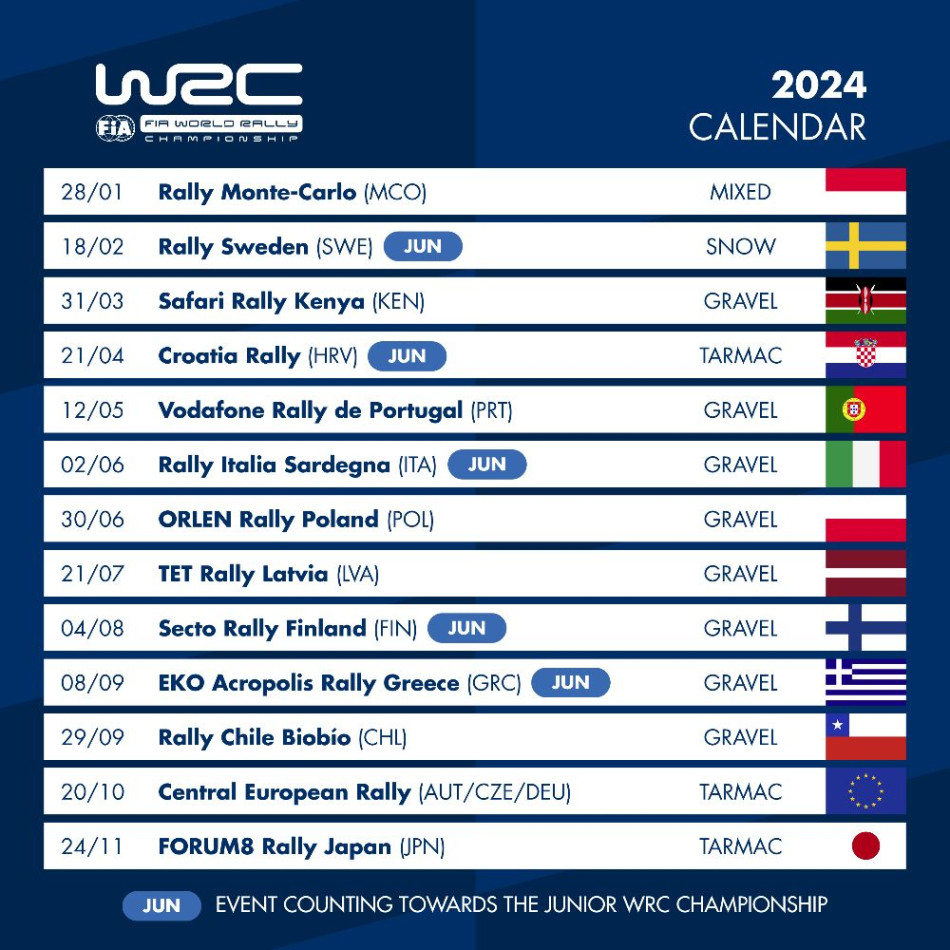
FIA World Rallycross Championship
The World Council approved an update to the 2024 FIA World Rallycross Championship calendar:
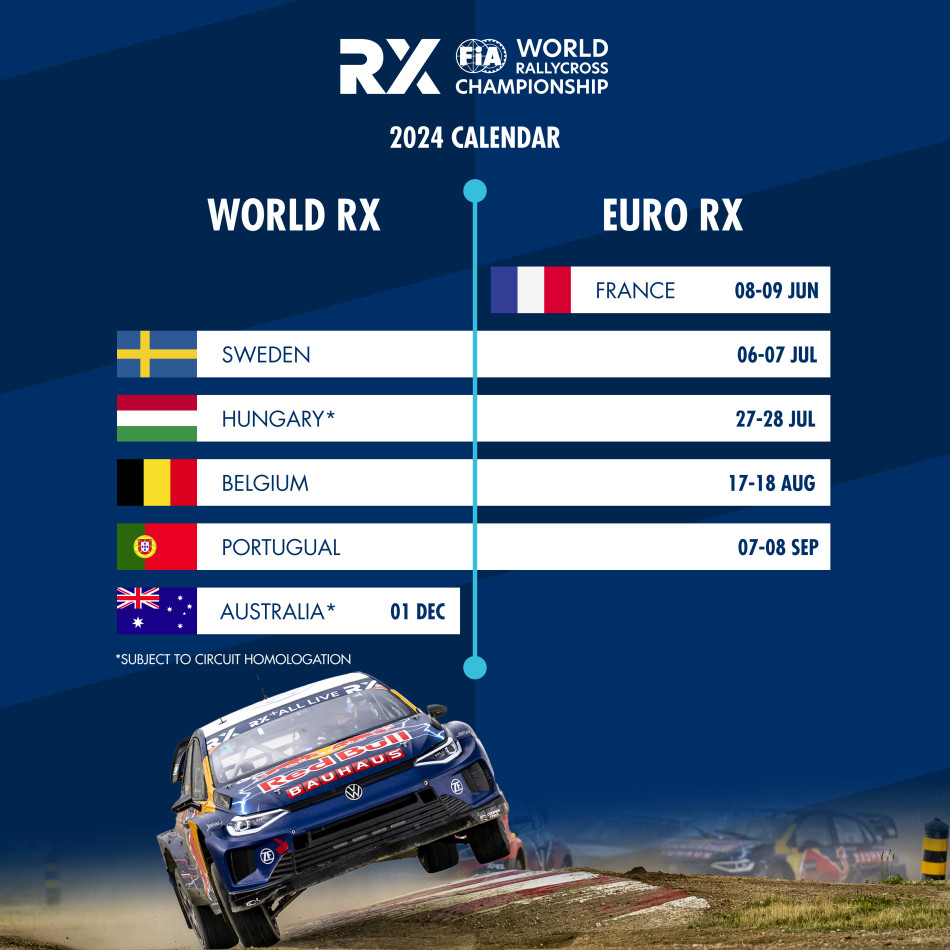
FIA GT World Cup
The seventh edition of the FIA GT World Cup will be held at the Guia Circuit from 12 to 17 November as part of the 2024 Macau Grand Prix.
Sporting and Technical regulations for the competition have also been approved. The format remains unchanged from 2023, with two 30-minute practice sessions followed by a single qualifying of the same duration. The world’s premier sprint-format competition for GT3 cars will be held across two race heats, with 12-lap qualifying race followed by a 16-lap title-deciding main race.
For the second year, the FIA GT World Cup will use sustainable fuel supplied by ETS Racing Fuels.
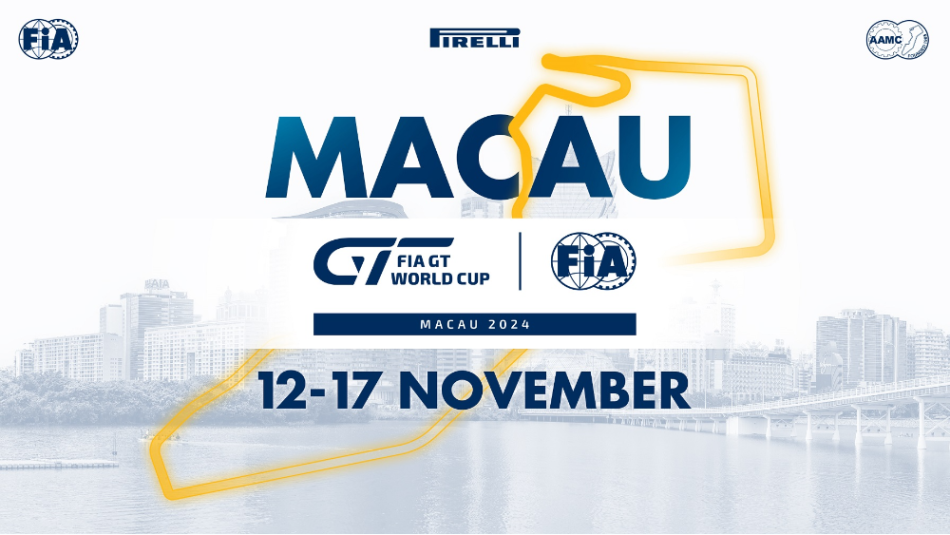
FIA Rally Commission
Updates to the 2024 calendars of the FIA European Rally Trophy, Middle East, African and NACAM Rally Championships were approved. Click here to view the changes.
Kumho FIA TCR World Tour
Due to the ongoing global logistics issues affecting sea freight, calendar changes for the 2024 Kumho FIA TCR World Tour have been approved by the World Council.
The Australian events at Sydney Motorsport Park and Mount Panorama Circuit scheduled for November 2024 will no longer be part of the Tour. Additionally, a revised date for the round in China and a change of the venue in Brazil, due to ongoing renovations at the Autódromo Internacional Ayrton Senna (Goiânia), have also been approved, with the Brazilian round moving instead to Interlagos.
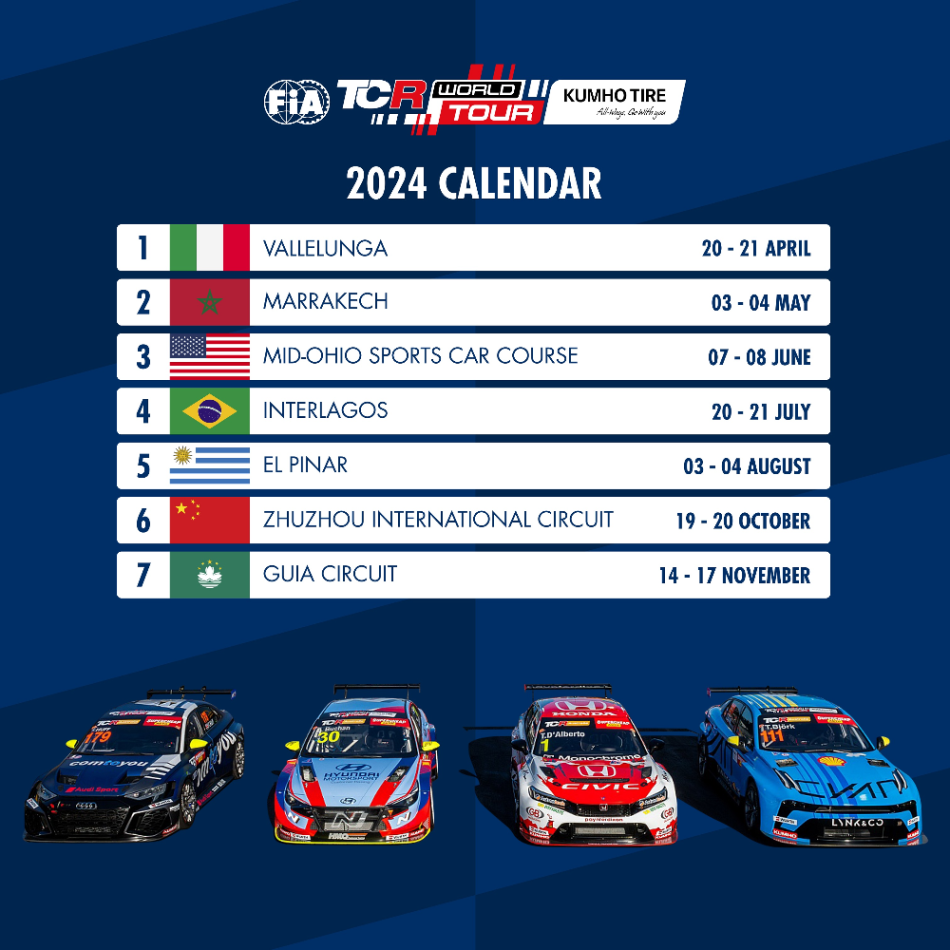
FIA Motorsport Games
World Council Members confirmed the choice of single suppliers for tyres for a number of categories of the forthcoming edition of the FIA Motorsport Games (23-27 October).
Following a thorough analysis of the submitted bids, it has been decided that Pirelli will supply the tyres for GT Racing, Touring Car, F4, Rally2 Tarmac and Gravel and Rally4 Tarmac and Gravel.
The karting Sprint categories (Junior, Senior and Mini) will run on MOJO tyres.
Sporting regulations for GT Endurance, GT Sprint, Touring Car, F4 and Truck Racing have also been validated.
Commission Appointments
The World Council confirmed the appointments of Pernilla Solberg as President of the FIA World Rally Championship Commission, Emilia Abel as President of the Road Sport Committee, and Burcu Cetinkaya and Elise Racette as Chairpersons of the Women in Motorsport Commission and the Volunteers & Officials Commission. These appointments increase the representation of women within the Commissions. See here for full details.
FIA Single-Seater Commission
The World Council has granted approval following the request from the Single Seater Commission to allow national level competitions to take place at venues outside of the organising territory in the following cases:
- The UK and the Netherlands in the context of the F4 British Championship
- Australia and Malaysia in the context of the F4 Australian Championship
- Italy and Spain in the context of the F4 Italian Championship
Volunteers and Officials Commission
The World Council approved an update regarding Steward licensing, mandating participation in the FIA International Stewards’ Programme and/or the FIA Regional Stewards’ Training in the past two years for the issuance, renewal or upgrade of an FIA International License for Stewards.
Circuit Commission
Following recent examples where non-permanent circuits have not been presented in a timely manner for final inspection, the World Council has approved a proposal to introduce a minimum time period of 24 hours between the final inspection and first competitive track activity to ensure the circuit is ready on time.
All non-permanent circuits must therefore be presented for a final inspection 48 hours prior to the proposed start date of first competitive track activity of the first international competition, and subsequently 24 hours prior to the first competitive track activity of any international competition, unless agreed otherwise by the FIA. This final inspection will normally take place the day before the first competitive track activity and must be completed to the FIA’s satisfaction and all conditions and specific requirements set out in the relevant regulations must be complied with before the circuit licence can be issued.
Upcoming World Motor Sport Council Meetings
Date
Venue
11 June
Within the FIA Conference week framework
17 October
Virtual
11 December
Within the FIA General Assemblies week framework

 Facebook
Facebook Twitter
Twitter
